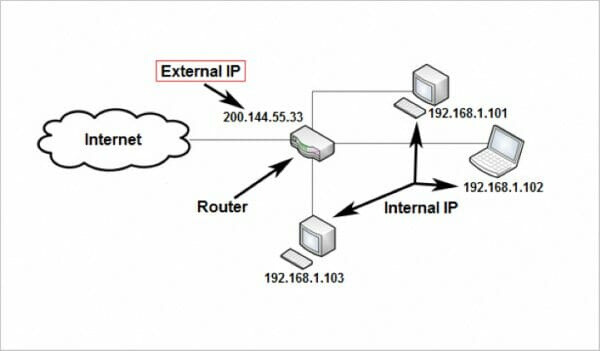What is an External IP Address?
In the vast realm of computer networking and the internet, every device that connects to the web requires a unique identifier to facilitate communication. This identifier is known as an IP address. While there are different types of IP addresses, such as internal and external, this article will focus specifically on external IP addresses and shed light on their significance in enabling internet connectivity.
ad
What is an External IP?
An external IP address, also known as a public IP or global IP, is a unique numerical identification provided to a device or network interface that is linked to the internet. It acts as a gateway for devices to communicate with other devices and services on the massive network that is the internet.
External IP addresses, as opposed to internal IP addresses, which are used within private networks to support local communication, are the public-facing addresses that allow devices to communicate over the internet. They are assigned by Internet Service Providers (ISPs) and are required for devices to perform activities such as web browsing, email exchange, streaming media, online gaming, and others.
External IP addresses are further classified into two types: dynamic and static.
ad
- Dynamic IP addresses: ISPs assign these IP addresses to devices on a temporary basis. When a device connects to the internet, the ISP assigns an accessible IP address from its pool dynamically. The IP address assigned to the device may change over time, especially if the device reconnects or the ISP reassigns addresses. Because of the unavailability of IPv4 addresses and the requirement to manage them efficiently, dynamic IP addressing is commonly used.
- Static IP addresses: Static IP addresses, on the other hand, are manually allocated to devices and do not change over time. They provide a device or service a constant and fixed address, ensuring that it can always be reached using the same identification. Static IP addresses are often used for hosting websites, running servers, securely accessing remote devices, and other situations that require a consistent IP address.
Here are some examples of how an external IP address can be used:
External IP addresses play a pivotal role in enabling various internet-based activities:
- Internet Connectivity: An external IP address acts like a gateway for devices to connect to the internet and communicate with other devices and services around the world.
- VoIP services: Voice over Internet Protocol (VoIP) services such as Skype use external IP addresses to establish calls and video chats between devices on separate networks.
- File sharing: External IP addresses can be used to connect devices on different networks and share files. You can, for example, utilize a cloud storage service like Dropbox to share files between your work computer and your home computer.
- Remote Access: Static external IP addresses are used for remote device access, such as connecting to a home network or accessing a corporate computer from a remote location.
- Streaming services: Streaming services such as Netflix use external IP addresses to determine your location and which content is available in your region.
- Web Hosting: External IP addresses are required for websites and online services to be accessible to users worldwide. Static IP addresses are frequently used to maintain consistent and dependable access.
- Gaming and Peer-to-Peer Connections: External IP addresses are used in online gaming or peer-to-peer applications to make direct connections between devices for seamless multiplayer experiences.
- Network Security: External IP addresses are required for safety purposes such as firewall configuration, intrusion detection, and tracking possible threats or unauthorized access attempts.
These are just a few examples of how external IP addresses are used in common internet usage. Understanding the function of external IP addresses will assist you in better understanding how the internet works and making the most of online services and communication.
Conclusion
External IP addresses are the public-facing gateways that allow devices and services to communicate across the internet. They serve as unique identifiers for devices, allowing them to access online resources, interact globally, and engage in a range of internet-based activities, whether dynamic or static. Understanding the importance of external IP addresses is critical for understanding how devices connect and interact inside the huge digital ecosystem known as the internet.
ad



Comments are closed.